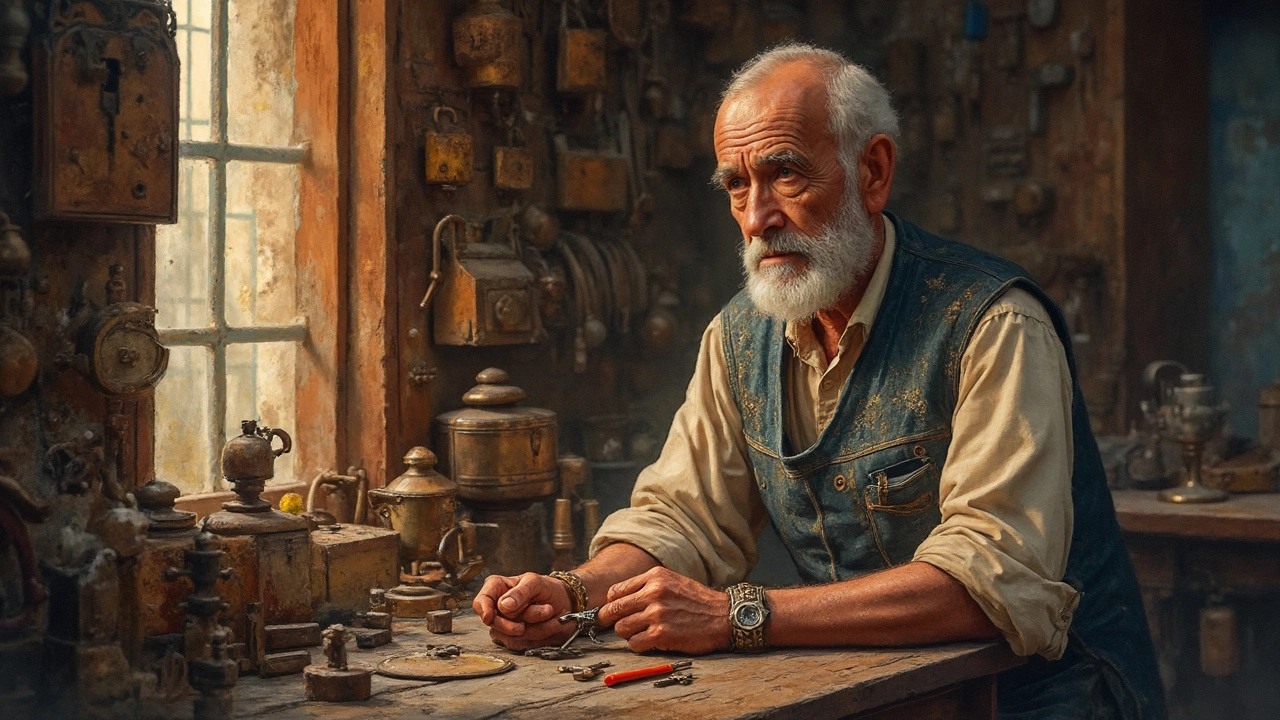
Locked doors have always stirred up a kind of feeling most people know too well—that quick flash of panic mixed with hope that some expert will get you back inside. But why does nearly everyone overlook the minds behind it all, the locksmiths, unless there’s a crisis? Sure, people might swap wild stories about Houdini's escapes or some shady character in a movie cracking a safe, but the real legends don’t always get paraded around in glossy magazine spreads. Here’s the thing: While you were hitting snooze this morning, thousands of locksmiths worldwide were already up, fixing dreams—and sometimes, saving the day. But the question bites: Who takes the crown as the greatest locksmith in the world?
History’s Rising Stars: Locksmith Pioneers Who Changed the Game
Step way back to the ancient Egyptians, who started making locks out of wood as early as 4,000 years ago. They weren’t fancy, mostly just wooden pins tumbling around inside a frame, but hey, these things kept out intruders and nosy goats. Fast-forward to the Romans—that crew loved their security so much, they wore little keys as rings. Imagine flashing your front door key as your power accessory. But the wildest jump happened in the 18th and 19th centuries, a time when locksmithing shook off dusty old traditions and became a true art.
Here’s where we meet legends like Robert Barron, who invented the double-acting tumbler lock in 1778, and Abraham O. Stansbury, father of the first patent for a pin tumbler. But the heavyweight? Joseph Bramah from England. His “Bramah lock” of 1784 was considered unpickable for over 60 years. People lined up to try and crack it—nobody managed until Alfred Charles Hobbs, a U.S. locksmith and eventual British rival. Hobbs came up big at the Great Exhibition in 1851, popping both the Bramah and Chubb locks. Talk about national pride wrapped up in springs and pins!
But don’t think Europe had all the fun. Linus Yale Sr. and his son Linus Yale Jr. in America cooked up the modern pin-tumbler lock in the 1840s-1860s. The Yale Jr. model is the one you likely still have on your front door. Big unlock right there. But the drama didn’t end in the past. These innovations sparked a cat-and-mouse game—every time someone built a stronger lock, another mind came along just itching to break it, then improve it. It’s the world’s longest running battle of wits.
| Locksmith | Key Invention/Contribution | Year |
|---|---|---|
| Robert Barron | Double-acting tumbler lock | 1778 |
| Joseph Bramah | Bramah lock ("unpickable") | 1784 |
| Jeremiah Chubb | Chubb detector lock | 1818 |
| Linus Yale Jr. | Pin-tumbler lock | 1861 |
| Alfred C. Hobbs | Picked major locks (Bramah & Chubb), spurring improvements | 1851 |
Pioneers didn’t just invent better locks—they put their pride on the line, challenging anyone to break their designs for cash prizes and bragging rights. Kind of the original ‘come at me, bro’ in the world of security.
Unsung Heroes: The Greatest Modern Locksmiths and Their Craft
There’s something wild about the way modern locksmiths operate—one foot in tradition, the other in the wild digital world where locks are apps and smart sensors. But you want names, right? Marc Tobias is a familiar face in today’s high-security circuit. He’s cracked open almost every lock you can imagine (legally), written books used by FBI and CIA trainees, and gets called in by major corps when they want to know if their vault is actually safe. His work with Medeco, one of the top lock companies, led to a redesign of their core systems.
Then there are guys like Deviant Ollam, co-founder of The Open Organisation Of Lockpickers (TOOOL). He travels the globe, teaching folks how to pick locks—yes, really—because he believes if you understand how they fail, you’ll buy or design better ones. Ollam made “locksport” cool, and more than once proved at DEF CON (the massive hacker conference) that even high-end locks can fold under pressure.
If you want a taste of Hollywood, check out the Francis brothers—Chris and Matt Francis. Los Angeles-based and infamous in the U.S. for their insane speed at getting into buildings without a scratch. They’ve worked with everyone from movie studios to antique shop owners, turning frustrated sighs into relief, and leaving zero evidence behind.
But being the greatest locksmith isn’t just about picking locks or breaking into places. It’s about deep knowledge of mechanics, material science, psychology (yep—spotting a con!), and public trust. Modern locksmiths are the ones corporations tap when disaster hits, or when billion-dollar data centers need new protection. Not all heroes wear capes—some wear tool belts packed with tension wrenches and magnifiers.
- Marc Tobias: Security expert, legal consultant, author of "Open in Thirty Seconds" and "Locks, Safes, and Security." He’s solved locks for Interpol and Fortune 500s.
- Deviant Ollam: Locksport pioneer, keynote speaker, lock educator at hacker conferences, consultant for government and tech companies.
- Chris & Matt Francis: Fastest lock openers in Southern California, known for zero-damage unlocks, used by film and TV productions for accuracy.
Statistics? Around 70% of home break-ins happen through forced entry but less than 5% involve modern high-security deadbolts. That’s why today’s legends aren’t afraid to call out bad hardware or show the public how to spot a dud. They know transparency is safer in the long run.

How to Spot a Legendary Locksmith: What Sets the Greats Apart
Anyone can hang a “Locksmith” shingle outside their door and promise a quick fix, but the true elite share a few signature moves. First, their reputations are built over decades, not overnight reviews. They’ve probably got clients from city officials to superstar musicians (who always seem to lose keys backstage). And their knowledge cuts deeper than just key shapes—great locksmiths know metallurgy, mechanical engineering, and criminal tricks.
When you’re searching for a locksmith, don’t fall for those $19.99 promises blaring across web ads—real professionals quote fair rates and never jack up prices at your doorstep. On the job, a great locksmith arrives with calm, neat gear, and a knack for making you feel less embarrassed about your locked car or jammed safe. They’re security pros first, with the humility to keep learning.
Check if they’re certified by organizations like the Associated Locksmiths of America (ALOA) or the UK’s Master Locksmiths Association (MLA). These groups test for actual skill, ethics, and constant upgrading of knowledge. Ask locals, too—firefighters, police, building supers—because these folks know who can be trusted with sensitive locks or emergencies.
One practical example? The best locksmiths usually spend their off-hours tinkering with new gadgets and reading obscure patents. Marc Tobias, for instance, owns thousands of rare locks at home just to take them apart for curiosity’s sake. That’s obsession, not just a job! You’ll notice top locksmiths also hit the road, attending expos where they challenge each other in front of public crowds. They’ll even debate the merits of certain tumblers or discuss the best way to set a master pin—nerdy, but these details are what keep your doors safe.
Want to test someone’s skill? Hand them an old wafer lock from the ’80s or a modern magnetic lock. If they can pick both, you’ve found a rare breed. Only a handful around the globe can swap between car keys, ancient safes, and fingerprint scanners in a single day.
- Word of mouth is the strongest signal. Who do police call when their station safe won’t budge?
- Licensing and certification: Look up ALOA, MLA, and local trade boards before you hire.
- Toolbox variety: Real locksmiths will have everything from pick guns to bump keys, not just a cheap tension wrench.
- Bragging rights: Ask if they’ve beaten a “challenge lock”—most legends love a good story.
There’s no global ranking, but some names echo around the world. In cities like Tokyo, Berlin, or Mumbai, locals swear by certain craftspeople. You’ll also find that women are making a mark, busting open the old boys’ club. A few years ago, a Tokyo-based locksmith named Emi Sato made waves after winning a prestigious European lockpicking competition, proving skill has no gender.
Locksmith Skills You Didn’t Know Existed: Secrets Behind the Greatest
Here’s what will surprise you: the best locksmiths aren’t just folks who know how to pick a cylinder or duplicate a key. These pros moonlight as inventors, security consultants, even forensic advisors. Got a crime scene that involves a damaged lock? Police might call a top locksmith for insight on whether it was forced or picked with finesse. Some even testify in court!
With smart home locks flooding the market, today’s locksmiths learn how to decode encrypted keycards, reset Bluetooth-enabled locks, and spot when a so-called “secure” system still has a glaring loophole. At security expos, you’ll spot them grilling sales folks about bypasses and snapping photos of the insides without any instruction manual. Lock design has to keep up with human curiosity—and these guys are always a step ahead.
One of the neatest skills? Master keying. This allows one key to open dozens of doors—think hotels or offices—without sacrificing security. But it’s art, not just science. Done right, it’s invisible; done wrong, it’s a disaster waiting to happen.
Most folks don’t realize locksmiths test their own skills during “locksport” tournaments—think bug-eating Survivor challenges, but the insects are locks and the challenge is speed, not gross-out factor. Competitions like the LockCon in the Netherlands crown champions for creative picks, rapid openings, and knowledge of weird foreign hardware. It’s intense and full of nerd energy.
Want to spot a future great? Watch for tinkering hands, relentless curiosity, and the ability to laugh when a lock refuses to budge. When my spouse Nita gets locked out (which, let’s face it, happens often enough) she’s stopped even looking sheepish—because she knows skill, not luck, wins that battle. Plus, she gets a front-row seat to the tiny miracles behind everyday security.
- Modern locksmiths regularly defeat fingerprint scanners or smart locks for clients locked out of their own homes (legally and with ID, of course).
- Many own their own 3D printers for testing key prototypes.
- The best keep up with legal changes—some states and countries restrict which locks or tools can be used.
So, the title of “greatest locksmith in the world” isn’t locked to one person forever. The legends of today stand on inventions from centuries back, learn from each other, and spark a little awe every time they pop a seemingly impossible lock. If you’re ever in a bind, or just want to geek out on security, hunt down the nearest pro—chances are, you’re about to watch magic happen in plain sight.


